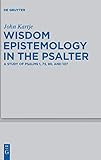Human Rights in Deuteronomy : With Special Focus on Slave Laws / Daisy Yulin Tsai.
Material type: TextSeries: Beihefte zur Zeitschrift für die alttestamentliche Wissenschaft ; 464Publisher: Berlin ; Boston : De Gruyter, [2014]Copyright date: ©2014Description: 1 online resource (244 p.)Content type:
TextSeries: Beihefte zur Zeitschrift für die alttestamentliche Wissenschaft ; 464Publisher: Berlin ; Boston : De Gruyter, [2014]Copyright date: ©2014Description: 1 online resource (244 p.)Content type: - 9783110363203
- 9783110385793
- 9783110364422
- 222.1506 22
- MLCM 2018/48065 (B)
- BS1275.55 .T73 2014
- online - DeGruyter
- Issued also in print.
| Item type | Current library | Call number | URL | Status | Notes | Barcode | |
|---|---|---|---|---|---|---|---|
 eBook
eBook
|
Biblioteca "Angelicum" Pont. Univ. S.Tommaso d'Aquino Nuvola online | online - DeGruyter (Browse shelf(Opens below)) | Online access | Not for loan (Accesso limitato) | Accesso per gli utenti autorizzati / Access for authorized users | (dgr)9783110364422 |
Frontmatter -- Contents -- Abbreviations -- 1. Introduction and Methodological Considerations -- 2. Exegesis of Deuteronomic Slave Laws -- 3. Comparative Studies of Biblical Slave Manumission Laws -- 4. Comparative Studies of ANE Slave Laws -- 5. The Laws and the Concepts of Human Rights in the ANE Law Books and in Deuteronomy -- 6. Conclusion: Summary, Contributions, and Further Avenues of Research -- Appendix A: A Compilation of Biblical and Cuneiform Law Collections -- Appendix B: Biblical and ANE Slave Laws and ANE Laws Related to Slave Issues -- Bibliography -- Index of Authors -- Index of Scripture References
restricted access online access with authorization star
http://purl.org/coar/access_right/c_16ec
The humanitarian concerns of the biblical slave laws and their rhetorical techniques rarely receive scholarly attention, especially the two slave laws in Deuteronomy. Previous studies that compared the biblical and the ANE laws focused primarily on their similarities and developed theories of direct borrowing. This ignored the fact that legal transplants were common in ancient societies. This study, in contrast, aims to identify similarities and dissimilarities in order to pursue an understanding of the underlying values promoted within these slave laws and the interests they protected. To do so, certain innovative methodologies were applied. The biblical laws examined present two diverse legal concepts that contrast to the ANE concepts: (1) all agents are regarded as persons and should be treated accordingly, and (2) all legal subjects are seen as free, dignified, and self-determining human beings. In addition, the biblical laws often distinguish an offender’s “criminal intent,” by which a criminal’s rights are also considered. Based on these features, the biblical laws are able to articulate YHWH’s humanitarian concerns and the basic concepts of human rights presented in Deuteronomy.
Issued also in print.
Mode of access: Internet via World Wide Web.
In English.
Description based on online resource; title from PDF title page (publisher's Web site, viewed 28. Feb 2023)


